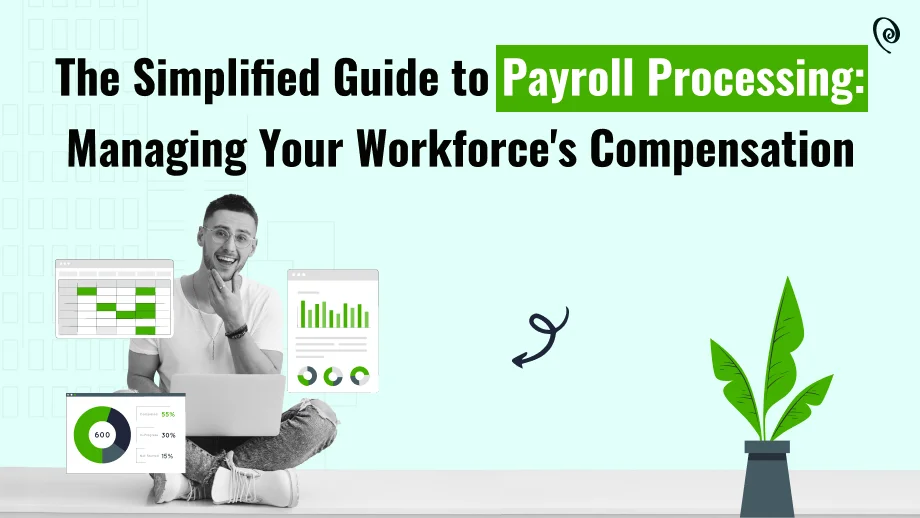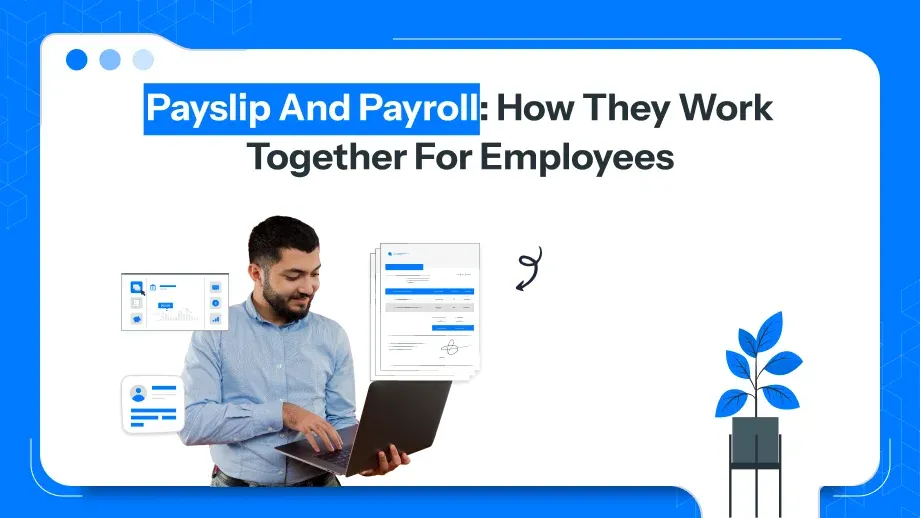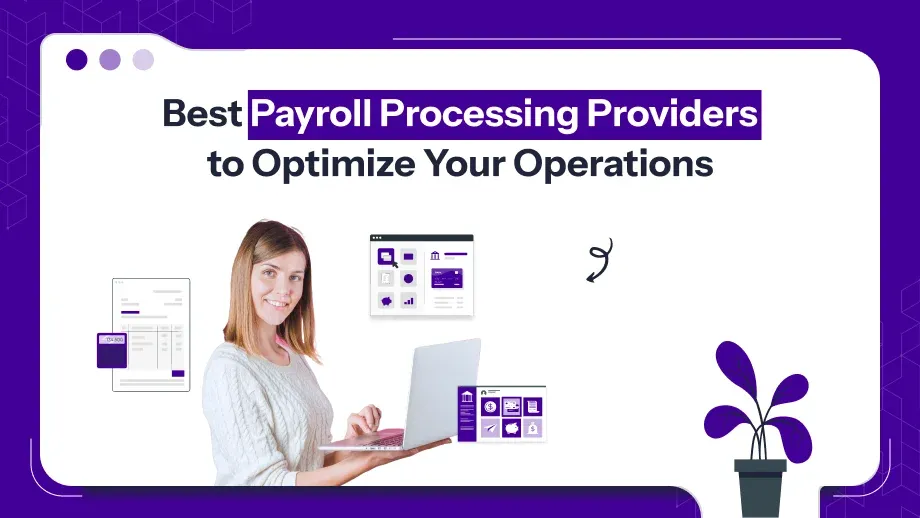Grab a chance to avail 6 Months of Performance Module for FREE
Book a free demo session & learn more about it!
-
Will customized solution for your needs
-
Empowering users with user-friendly features
-
Driving success across diverse industries, everywhere.
Grab a chance to avail 6 Months of Performance Module for FREE
Book a free demo session & learn more about it!
Superworks
Modern HR Workplace
Your Partner in the entire Employee Life Cycle
From recruitment to retirement manage every stage of employee lifecycle with ease.


Seamless onboarding & offboarding
Automated compliance & payroll
Track performance & engagement
The Simplified Guide to Payroll Processing: Managing Your Workforce’s Compensation
- payroll system process
- 10 min read
- November 10, 2023

In the complex landscape of business operations, one critical aspect often overlooked is payroll processing. It’s a fundamental component of managing your workforce effectively, ensuring that employees are compensated accurately and on time.
In this blog, we’ll demystify the intricacies of payroll, from understanding tax regulations and deductions to choosing the right payroll software. Whether you’re a small business owner or an HR professional, our user-friendly insights and practical tips will empower you to streamline your payroll processes, reduce errors, and keep your employees satisfied.
Running payroll manually can be time-consuming and prone to errors. Therefore, many businesses opt for automated payroll systems, which streamline the process and help ensure accuracy. These systems facilitate the efficient management of payroll cycles, encompassing the time from the initiation of pre-payroll activities to the disbursal of net salaries to employees. In summary, payroll processing is a vital function for any business, involving various steps and considerations to guarantee that employees are compensated correctly and all legal obligations are met.
Let’s dive in!
- What is Payroll Management?
- The Significance of The HR payroll process ensures Payroll Process Steps
- The Payroll Process Explained In Detail
- Key Components of Payroll Processing
- Benefits of Using HR Payroll Software
- How To Choose the Best Payroll Software?
- Popular Payroll Software Options
- The Online Payroll System Advantages For All
- Superworks: A Leading Example For Payroll Management
- Payroll Process Management For Effective Payroll
- Common Payroll Management Mistakes to Avoid
- In Conclusion
What is Payroll Management?

Payroll management is a crucial function within any organization that involves calculating and disbursing compensation to employees. It encompasses various tasks related to employees’ salaries, wages, bonuses, deductions, and taxes.
The HR payroll process ensures that employees are paid accurately and on time, making it a fundamental aspect of human resources (HR) management.
The Significance of The HR payroll process ensures Payroll Process Steps

Accurate and timely payroll is vital for several reasons:
-
Employee Satisfaction: Timely and accurate payments contribute to employee satisfaction and motivation.
-
Legal Compliance: Proper payroll processing ensures compliance with labor laws and tax regulations.
-
Financial Accuracy: Payroll directly affects a company’s financial stability, making accuracy imperative.
-
Data Management: Payroll data is essential for HR and accounting functions, making it a valuable source of information.
-
Productivity: Streamlined payroll processes save time and resources, allowing HR teams to focus on strategic tasks.
The Payroll Process Explained In Detail
Payroll Process Steps
The payroll process steps involves a series of steps, which can vary depending on the organization’s size and complexity. Here’s a simplified breakdown of the typical payroll process:
Collect Employee Information
Gather employee data, including hours worked, overtime, new hires, and terminations.
Calculate Earnings
Determine gross pay, which includes regular wages, overtime, bonuses, and commissions.
Deduct Taxes and Deductions
Calculate and deduct federal, state, and local taxes, as well as employee contributions to benefits such as health insurance, retirement plans, and more.
Net Pay Calculation
Subtract taxes and deductions from gross pay to calculate the employee’s net pay (take-home pay).
Payroll Recordkeeping
Maintain records of each employee’s earnings, deductions, and tax information.
Tax Deposits and Reporting
Submit payroll taxes to the appropriate government agencies and file required reports.
Distribute Payments
Disburse employee salaries through various methods, such as direct deposit or physical checks.
Reconciliation
Ensure that the total payroll expenses match the company’s financial records.
Compliance and Reporting
Generate reports for compliance purposes, including tax forms.
Key Components of Payroll Processing

One of the key components of payroll is the actual payroll process, where the calculated salaries are paid to the employees. This involves the distribution of funds, often through direct deposit into employees’ bank accounts. Post-payroll activities, such as reconciling payroll taxes and generating payroll reports, are essential to meet legal obligations and maintain accurate financial records. Income tax, social security, and professional tax are among the necessary deductions made during processing payroll to comply with legal requirements.
To execute the payroll process effectively, consider these key components:
-
Payroll Policies: Define clear payroll policies, including pay schedules, overtime rules, and benefit deductions.
-
Payroll Calendar: Maintain a payroll calendar to ensure that processing deadlines are met consistently.
-
Employee Data: Keep accurate and up-to-date records of employee information, such as Social Security numbers, tax forms, and banking details.
-
Tax Withholding Tables: Stay informed about changing tax rates and regulations to ensure accurate tax withholding.
-
Payroll Software: Invest in HR and payroll software to automate and streamline payroll tasks.
Benefits of Using HR Payroll Software
The Payroll System Process offers numerous advantages for managing the payroll process:
-
Efficiency: Automating calculations and data entry reduces manual errors and saves time.
-
Accuracy: Software can perform complex tax calculations with precision, reducing compliance risks.
-
Cost Savings: Streamlining payroll processes can lead to cost savings through reduced administrative overhead.
-
Data Security: Protect sensitive payroll data with robust security measures and encryption.
-
Reporting: Generate detailed reports and analytics to monitor payroll trends and compliance.
-
Scalability: The payroll process system can adapt to your organization’s growing needs.
How To Choose the Best Payroll Software?
Criteria for Selecting Payroll Management Software
Selecting the right payroll software is essential for seamless payroll management processing. Consider these criteria when evaluating payroll management software options:
-
User-Friendly Interface: Choose software for payroll company India that is easy to navigate and use, reducing the learning curve for your HR team.
-
Compliance Features: Ensure that the software can handle tax compliance and reporting for your specific location.
-
Integration: Look for software that integrates smoothly with your existing HR and accounting systems.
-
Scalability: Opt for software that can grow with your organization and accommodate changes in workforce size.
-
Customer Support: Assess the availability and quality of customer support for troubleshooting issues.
-
Cost: Compare pricing structures and consider the overall value provided by the software.
Read more: 5 Top Challenges in Managing Global Payroll and How to Overcome Them Easily

Want to simplify your payroll processing?
Get your hands on Super Payroll, powered by Superworks that can automated any and every payroll process in no time. That means, you will save time, energy and a large chunk of money by reducing non-compliance issues.
Try Super Payroll’s awesome features and modules now!
Popular Payroll Software Options
Several payroll software solutions cater to different business needs. Some popular options include:
-
ADP Workforce Now: A comprehensive HR and payroll platform suitable for medium to large enterprises.
-
Gusto: User-friendly software designed for small and mid-sized businesses.
-
QuickBooks Payroll: Integrates with QuickBooks accounting software and is suitable for small businesses.
-
Paycom: Offers a wide range of HR and payroll features, including time tracking and benefits administration.
-
Zenefits: A cloud-based HR and payroll solution that includes benefits management.
-
Superworks: Known for its robust payroll and HR features, Superworks is a versatile option for businesses of all sizes.
The Online Payroll System Advantages For All
Advantages of an Online Payroll System
Online payroll systems, also known as cloud-based or web-based payroll systems, offer several benefits:
-
Accessibility: Access payroll data from anywhere with an internet connection, enhancing flexibility for remote work.
-
Automatic Updates: Cloud-based payroll system process are updated automatically, ensuring you always have the latest features and compliance updates.
-
Data Security: Providers invest in top-notch security measures to protect your sensitive payroll data.
-
Scalability: Easily scale the system to accommodate a growing workforce or changing needs.
-
Cost-Efficiency: Reduce the need for on-premises hardware and IT maintenance costs.
Superworks: A Leading Example For Payroll Management
Superworks is an exemplary online payroll system known for its robust features and user-friendly interface. It offers:
-
Employee Self-Service: Empower employees to access pay stubs, tax forms, and personal information.
-
Compliance Management: Stay up-to-date with tax regulations and automate tax filings.
-
Integration: Seamlessly connect Superworks with your existing HR and accounting systems.
-
Advanced Reporting: Generate custom reports to gain insights into your payroll data.
-
Data Security: Benefit from industry-standard security protocols to safeguard your payroll data.
Unique Aspects of Payroll Processing in India
Payroll processing in India comes with its own set of challenges and intricacies due to the country’s diverse tax structure and labor laws. Key considerations include:
-
Tax Deductions: India has various tax deductions, exemptions, and slabs that need to be accurately applied.
-
Statutory Compliance: Companies must adhere to statutory requirements, such as the Provident Fund (PF) and the Employee State Insurance (ESI) Act.
-
Localization: Indian payroll processing often requires support for multiple languages, regional holidays, and diverse payroll structures.
What Is Important In the Indian Payroll Processing System?
To navigate payroll management in India effectively, consider the following:
-
Compliance First: Ensure strict compliance with all Indian labor laws and tax regulations.
-
Provider Expertise: Partner with a HR Payroll Software provider experienced in Indian payroll process.
-
Localization: Use software that can accommodate regional variations and multiple languages. Integration with Computer-Assisted Translation (CAT) tools can further enhance accuracy and efficiency by streamlining multilingual content management.
-
Data Security: Protect sensitive payroll data in compliance with Indian data protection laws.
Also, See: Compliance Benefits of Using Payroll Services – Switch to Superworks!
Payroll Process Management For Effective Payroll
Managing the payroll process efficiently involves more than just software. Implement these strategies for effective payroll process management:
-
Clear Policies: Establish and communicate transparent payroll policies to avoid misunderstandings.
-
Training: Provide training to HR staff responsible for payroll process to keep them updated on best practices.
-
Regular Audits: Conduct regular payroll audits to identify and rectify errors promptly.
-
Communication: Maintain open communication with employees regarding pay-related matters.
-
Documentation: Keep thorough records of all payroll and compliance documents.
Common Payroll Management Mistakes to Avoid
Avoid these common mistakes to ensure smooth payroll management:
-
Inaccurate Data: Ensure employee data is up-to-date to prevent errors in payroll calculations.
-
Missed Deadlines: Missing payroll tax filing deadlines can result in penalties and legal issues.
-
Ignoring Compliance: Ignoring labor laws and tax regulations can lead to costly consequences.
-
Lack of Backup: Always have a backup plan in case of system failures or emergencies.
-
Poor Communication: Failing to communicate changes in payroll policies or issues can lead to employee dissatisfaction.
Effective India payroll processing is essential for the financial stability and employee satisfaction of any organization. By understanding the payroll process, selecting the right payroll software, and embracing modern online payroll systems, you can streamline your payroll management and navigate the complexities of payroll in India. With careful management and adherence to best practices, you can ensure that your workforce is compensated accurately and on time, fostering a positive work environment and driving organizational success.
In Conclusion
Adopting an automated payroll system significantly enhances the efficiency and accuracy of the epayroll process. Automated payroll streamlines the various stages of payroll processing, from gathering information about an employee’s gross wages and hours worked to calculating the necessary deductions for taxes and other obligations. This technology enables businesses to make timely and accurate salary payments, ensuring that each employee receives the correct amount of compensation. Moreover, automated systems help businesses maintain a comprehensive list of each employee’s payroll details, making it easier to track and manage financial records.
To make the most of an automated payroll system, businesses should be diligent in selecting a reliable payroll service provider. The chosen service should be able to handle the size of the business and provide accurate payroll information. Businesses should also take a proactive approach to ensure that the necessary steps to set up and run the automated payroll are followed. Even if a company is under the services of a payroll service provider, employers must remain informed about the payroll process and the accurate payroll taxes deducted. By doing so, businesses can make sure that salary payments are made on time, complying with legal obligations and promoting overall financial health. Automated payroll not only simplifies the payroll process but also minimizes the likelihood of errors, making it an invaluable tool for businesses of all sizes.
Also See: components of gross salary in india | hr and payroll service | payroll process in india | best payroll software | software payroll system | payroll software for big companies




